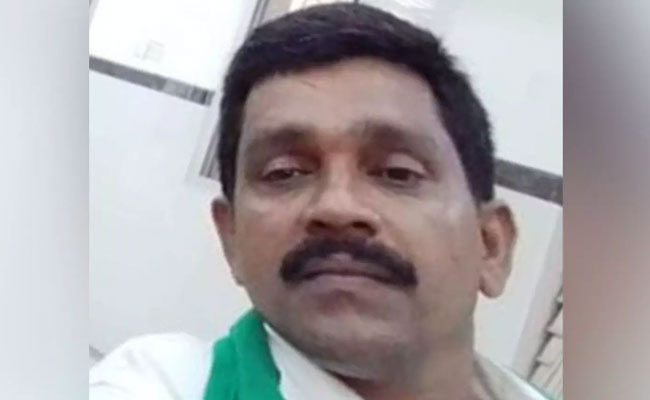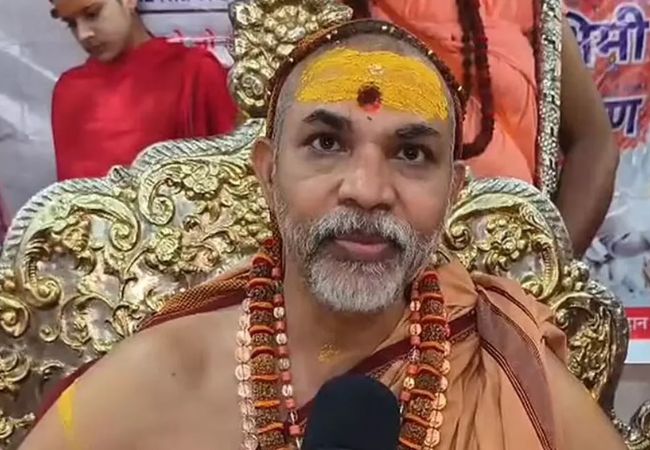Mangaluru: Jayananda Kulal, a member of the Ganjimutt Gram Panchayat supported by the BJP, was arrested by Bajpe Police on Wednesday for the alleged illegal sale of liquor at a roadside shop in Mogaru village.
Jayananda Kulal, known for his active involvement in the Sangh Parivar, is reported to have close ties with Mangalore North MLA Dr. Y Bharat Shetty, as suggested by local Congress activists who shared a photo of the two on social media.
The arrest was made following charges of unlawfully selling liquor at a makeshift kiosk in Thekkemar, Mogaru village. Bajpe Police, on their routine patrol on Wednesday evening, observed customers fleeing from the kiosk upon noticing the police vehicle. This suspicious activity prompted the police to investigate further.
Upon inspection of the kiosk, the police discovered 18 tetra packs containing up to 90 ml of liquor from various brands. Jayananda Kulal, the proprietor of the kiosk, was taken into custody. The FIR filed against him alleges that he procured liquor from a nearby shop in Thekkemar and sold it at an inflated price in his kiosk.
Despite the incident occurring on December 27, Bajpe Police refrained from informing the media about the case, leading to criticism on social media. Concerns were raised regarding the absence of information on the police blog, where details of recent cases are typically uploaded. Users also noted the contrasting handling of a recent cattle transport case, which was made available on the police blog.
In response to allegations of discrimination, Bajpe Station Inspector Sandeep clarified that there was no bias in their actions. He explained that if a case is related to the Excise Department, a police officer might refuse information, and in such instances, it is advisable for the media to contact senior officers for details.
Let the Truth be known. If you read VB and like VB, please be a VB Supporter and Help us deliver the Truth to one and all.
Lucknow (PTI): The Uttar Pradesh Congress on Wednesday staged a statewide protest demanding a fair and transparent inquiry into the FIR lodged against Swami Avimukteshwaranand Saraswati and those who filed the complaint against him.
In a statement issued here, the party said memorandums addressed to Prime Minister Narendra Modi were submitted through district magistrates in all districts of the state.
Uttar Pradesh Congress spokesperson Manish Hindvi told PTI that the memorandums were handed over through the district administration in all 75 districts.
In the memorandum, the party alleged that Saraswati and his disciples were "unnecessarily harassed and humiliated" by police on the occasion of Amavasya and were prevented from taking a ritual bath (at the Magh Mela). It further alleged that some disciples were manhandled and taken to a police station.
The memorandum also claimed that an FIR was later registered against Saraswati, his disciple Swami Mukundanand Brahmachari and several unidentified persons in a sexual harassment case. It termed the case a "conspiracy" aimed at tarnishing the seer's reputation.
Citing Articles 25 and 26 of the Constitution, the memorandum stated that these provisions guarantee religious freedom and the right of religious denominations to manage their own affairs.
It described the position of shankaracharya held by Saraswati as "one of the highest spiritual posts in Sanatan tradition" and alleged that the entire episode appeared to have been "orchestrated in a planned manner".
"We request that the background of the persons who got the FIR registered be investigated in a transparent manner by a retired high court judge and strict action be taken against them," the memorandum said.
It also sought a "fair and transparent probe" into the allegations levelled against Saraswati so that the truth could be established.
Earlier, Uttar Pradesh Congress president Ajay Rai had told reporters in Varanasi after meeting Saraswati that the party stood firmly with him.
The Congress said it would continue to press for an impartial inquiry into the entire episode.
On February 21, an FIR was lodged in Prayagraj against Saraswati and his disciple Mukundanand Brahmachari on charges of sexually abusing two persons, including a minor, over the past year at a gurukul and religious congregations, including the recently concluded Magh Mela.
Days after he was booked, Saraswati had said on Monday that he would not oppose his arrest and asserted that the "fabricated story" would be exposed sooner or later.
At a press conference on Wednesday, Saraswati alleged that criminals rule in Uttar Pradesh, level allegations and influence investigations, as he denied having any contact with the two persons for whose alleged sexual abuse he has been booked.



_vb_77.jpeg)
_vb_00.jpeg)
